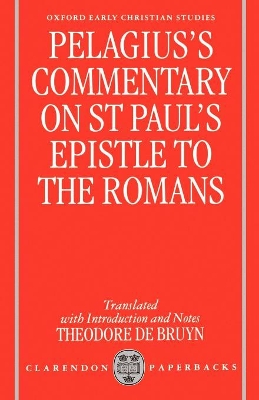Oxford Early Christian Studies
1 total work
The Pelagian controversy - whether man is saved through predestination or by his own free will - has proved one of the most enduring and fiercely contended issues of the Christian church, and has secured Pelagius, a British theologian and exegete who taught in Rome during the late 4th and early 5th centuries, a lasting place within its history. Few of Pelagius' writings, however, have been preserved, and until recently none was available in English translation.
This volume presents Pelagius' Commentary on St Paul's Epistle to the Romans for the first time in English. The Commentary, one of thirteen on the Pauline Epistles, dates from the time when Pelagius was active in Rome, before he became embroiled in controversy. But already there are adumbrations of
the later debate and signs of different currents of thought in Italy and beyond.
In his introduction Theodore de Bruyn discusses the context in which Pelagius wrote the commentary and the issues which shaped his interpretation of Romans. He also takes up questions about the edition of the commentary. The translation is annotated with references to Pelagius' contemporaries. A new recension of Pelagius' text of Romans is presented in an appendix.
This volume presents Pelagius' Commentary on St Paul's Epistle to the Romans for the first time in English. The Commentary, one of thirteen on the Pauline Epistles, dates from the time when Pelagius was active in Rome, before he became embroiled in controversy. But already there are adumbrations of
the later debate and signs of different currents of thought in Italy and beyond.
In his introduction Theodore de Bruyn discusses the context in which Pelagius wrote the commentary and the issues which shaped his interpretation of Romans. He also takes up questions about the edition of the commentary. The translation is annotated with references to Pelagius' contemporaries. A new recension of Pelagius' text of Romans is presented in an appendix.
